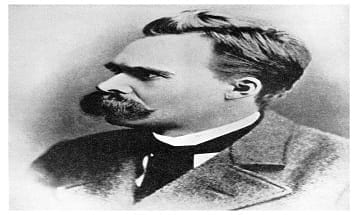
Blog
Friedrich Wilhelm Nietzsche

Nietzsche is one of the most prominent philosophers of the 19th century.
The most important pillar of Nietzsche’s philosophy is the discussion of “self-mastery,” in which Nietzsche points out that by overcoming oneself, a person transforms from an ordinary human into an Übermensch (superman) and performs deeds worthy of the Übermensch. The higher a person’s ability to overcome their inner desires and impulses, the more their spirit attains a higher level of perfection.
One of Nietzsche’s famous sayings is: “Become who you are.”
What did Nietzsche mean by this golden phrase?
All people live their lives within the framework and mold defined for them by others around them… Through the roles assigned by family and society, they choose their profession, determine their beliefs and values, and so on. The effort to achieve what others want and the continual role-playing to please others drives them to the edge of a cliff that increasingly distances them from their true core self.
Nietzschean philosophy is a guide to taking one’s own role, not the roles defined by others. This philosophy demands that a person move in a path that breaks free from others’ defined rules and enters rules set by oneself, so that an ordinary human, at the end of the path, transforms into an Übermensch.
Nietzsche’s general idea can be likened to a four-legged chair on which the dignity and grandeur of a human being rests, and the absence of any of these legs results in the fall of human dignity.
The first leg of the chair: Do not run away from envy; do not deny envy; admit to envy.
In this pillar, Nietzsche points out that envy encompasses a large part of human life and is, in other words, a driving force for activity, motivation, and reaching excellence and perfection. Here appears the root of the divide between Nietzsche and Christianity, which was also the religion of his parents. Christianity views envy as sorrowful and condemns the envious person, whereas Nietzsche believes that the silence of envy is the silence and halt of human progress.
Nietzsche says: “What we envy in others is proof that we would have liked to become that ourselves.”
Directing envy and jealousy in a channeled and not pathological manner leads a person to happiness and perfection.
The second leg of the chair: Do not be Christian.
Nietzsche openly and boldly stated that in all of Christian culture, only one person is worthy of praise — the Roman emperor who ordered the crucifixion of Christ. This confession clearly expresses his disdain and opposition to Christianity. As mentioned earlier, Christianity protects a person from envy, and Nietzsche says when you cease to envy, you cease to move and become like stagnant water, motionless and rotten.
Nietzsche called Christianity “the conscience of slaves” and believed that Christianity is a mask worn by a group of submissive slaves who, unable to access some of their desires and impulses, exonerate themselves behind this mask.
Nietzsche believed that Christians behave hypocritically because, outwardly, they appear humble and free from desire for power, fame, lust, etc., but in reality, they are unable to achieve these titles, and if the opportunity arises, they will not remain loyal to the mask they wear.
The third leg of the chair: Not drinking alcohol and not being drunk
Nietzsche was strongly opposed to alcoholism and drinking alcohol, to the extent that he condemned both alcohol and Christianity side by side and placed them in the same category, considering these two as factors responsible for the destruction of Europe. Nietzsche believed that Christianity and alcohol make humans incapable of healing their own pains and cause them to neglect themselves. It even leads people to settle for their life conditions… This unconsciousness and distortion results in human regression.
The fourth leg of the chair: God is dead
Some people mistakenly think Nietzsche’s statement means disbelief in God and label him an atheist. However, Nietzsche meant the inner God of humans and the progression of humanity and society toward godlessness. Nietzsche believed that humans’ inner selves should be enriched with art, literature, philosophy, and so on, to serve as a shield against godlessness.
He not only admitted that God is dead, but he also believed that universities and academic centers killed God, because humanities and subjects that could be the guiding light to human happiness were replaced by dry and insignificant topics, a method he called a betrayal of humanity.
When a person no longer feels responsible or accountable to their inner God, it marks the beginning of indulging in moral vices, corruption, and injustice…
When Nietzsche uses the term “death” for God, it can be understood that something which never existed can never die. Therefore, Nietzsche acknowledges the existence of God but refers to the death of God within humans. Consequently, this does not mean Nietzsche was an atheist.
برای مشاوره رایگان و رزرو وقت (یا اگر تماس گرفتید و قادر به پاسخگویی نبودیم) شماره تماس خود را وارد کنید. ما به زودی با شما تماس می گیریم!



